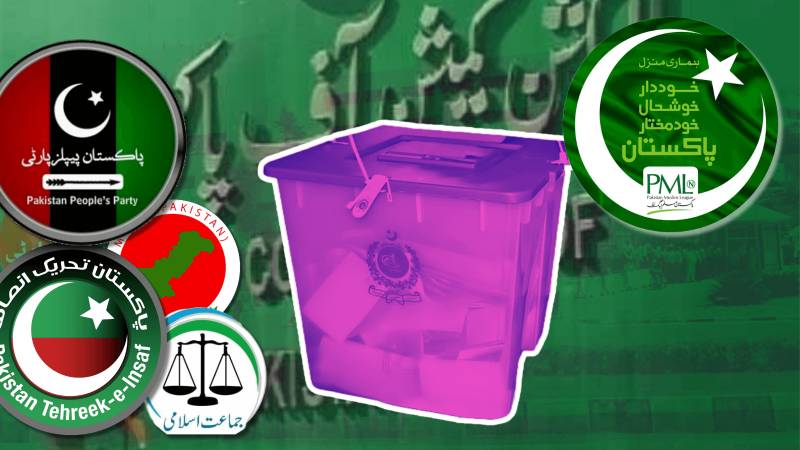
The election season has well and truly commenced in Pakistan, with political activity intensifying in recent days. Even as political parties start dusting off their election paraphernalia, they have taken stock of the available candidates within their ranks and have now started to dip into the 'freelance market' of candidates - otherwise known as turncoats, to complete their quotas.
As a result, most of these 'political migrants', locally branded as ‘Lotay’, have started flapping their wings for ‘green pastures’ but are still too shy to publicly announce the change in their allegiances.
This suggests that the upcoming general elections in the country early next year will be a hotly contested affair.
For the turncoats, however, the situation this year has become quite complex.
Amongst the turncoats are the electables, candidates who are quite formidable in their native constituencies and can often beat out a candidate from a major party but are usually politically not aligned with any party. Mainly hailing from Punjab, these candidates usually contest as independents. They switch their allegiances to whichever party comes into power.
Then you have your regular turncoats. These are politicians who have a long history of switching their allegiances almost every election, based on who promises them an electoral ticket and post-election perks.
This year, there has been the emergence of the 'committed turncoat'. These politicians were previously aligned with Pakistan Tehreek-e-Insaf (PTI) until the party was ousted following a no-confidence vote or until May 9, 2023.
Save for a handful, many PTI members have either joined one of the two splinter groups of the main party, Istehkaam-e-Pakistan Party (IPP) by former PTI stalwarts Jahangir Khan Tareen and Abdul Aleem Khan or the Khyber Pakhtunkhwa (KP) based PTI-Parliamentarians (PTI-P) led by PTI's former KP chief ministers Parvez Khattak and Mahmood Khan. Some, however, announced that they were quitting politics entirely. But, many politicians remain aligned with the PTI. Some are expected to stay with the party despite the odds, while others have been waiting for the opportune time to jump ship.
Around 30 PTI MNAs, mainly from Punjab, have been poised to join the Pakistan Muslim League-Nawaz (PML-N). After last year's no-trust motion ousted PTI Chairman Imran Khan from his coveted prime minister's chair, these MNAs had either refused to submit their resignations from the house or had privately pleaded with National Assembly Speaker Raja Pervez Ashraf not to accept their resignations since they did not support Imran Khan's decision to quit the assembly en masse after he was voted out of power.
Most of these lawmakers were given assurances by the PML-N that they would be accommodated in the next elections.
Many of these potential candidates, who desired not to be named at this stage, disclosed that they had filed their applications in response to Pakistan Muslim League-Nawaz's (PML-N) general call for candidates.
In background talks with various politicians and the names rumoured to get electoral tickets, around two dozen potential candidates who had previously contested for the PTI are likely to get electoral tickets from the PML-N. These include PTI dissidents such as former opposition leader in the national assembly Raja Riaz (who has in his political career contested on PML-N tickets), former National Assembly Public Accounts Committee chairperson and a PTI dissident Noor Alam Khan, Basit Sultan, Afzal Dhandala, Qasim Noon, Amjad Farooq Khosa, Ahmed Yar Hiraj, Rai Hassan Nawaz and many others.
The PML-N, whose party leadership is currently on a tour of Balochistan as they seek to mend ties and build bridges with partners to secure their victory in a few months, are accepting applications for new candidates until next week (November 20). Party insiders say that thus far, they have received a large number of applications from PTI dissidents.
This has prompted complaints from regular turncoats, who will now have to look elsewhere for a route into parliament.
Some of these politicians include Khwaja Sheraz, Saifuddin Khosa, Sikandar Hayat Bosan, Mustafa Khar, Ashiq Gopang, Khusro Bukhtiar, Amir Dograr, Niaz Jhakar, Raza Hayat Hiraj, Ali Gilani and others. They have an established record of changing loyalties, and this pattern is expected to repeat this year. Should they fail to obtain a party ticket, they have decided to contest as independent candidates.
Current political landscape
All major political parties have launched their electoral campaigns and candidate connection drives with rallies, public interaction and other outreach activities.
Apart from meeting with members of their party, they are also meeting with potential candidates.
The PML-N has taken the lead in this activity. Not only are they making contact with their workers and supporters, but they are also connecting with other parties who can join them in their government.
So far, it has held wide-ranging talks with the Muttahida Qaumi Movement (MQM-P), receiving their assurance of cooperation. They have also contacted the Pakistan Muslim League-Functional (PML-F) of the Pir Pagara, suggesting that Muslim Leagues must stand together.
Recently, Jamiat Ulema-e-Islam (JUI-F) Chief Maulana Fazlur Rahman has also contacted the PML-N with hopes of discussing the political scenario in the context of Elections 2024.
On the other hand, the Pakistan Peoples Party has also had contacts with the Pakistan Muslim League-Quaid (PML-Q) to discuss seat adjustments.
The PPP, however, continues to maintain a frosty relationship with the PML-N, whom it views as its political rival in the polls.
Meanwhile, the PTI has also announced its plans to contest the upcoming elections nationwide. Talking to [The Friday Times], PTI leader Advocate Shoaib Shaheen said they have chalked out a strategy to award candidates tickets despite many difficulties.
Electoral canvassing
With elections less than three months away, candidates have started luring voters in their constituencies.
Politicians have enhanced their public interaction by attending local wedding ceremonies, functions, funerals, etc.
Some have even resorted to arranging meals either near or at their houses to attract people.

